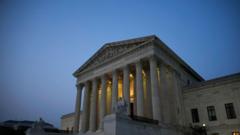Examining conflicting views on presidential power, the Supreme Court heard arguments concerning President Trump's contentious directive to end birthright citizenship, a case poised to reshape immigration laws across the nation.
Legal representatives debated whether lower court judges should retain the authority to block sweeping presidential orders. The US solicitor general claimed that federal judges were overstepping their bounds, while New Jersey's solicitor general represented states asserting this action could result in disarray across the citizenship system, leading to inconsistent rights among states.
The justices grappled with two crucial dilemmas: the validity of nationwide injunctions issued by lower courts and the constitutional implications of Trump's order, which critics argue contradicts the 14th Amendment. D John Sauer, the solicitor general, suggested that the rapid decision-making by judges must be checked, proposing alternative legal routes to manage lawsuits more effectively.
During the two-hour hearing, justices including Elena Kagan raised skepticism regarding the administration's chances of success, given its previous losses in smaller courts on the same issue. Meanwhile, Justice Samuel Alito voiced concerns over the unchecked power of lower courts to impose widespread injunctions, questioning the validity of their decisions.
Outside the court, significant public opposition emerged, with protests led by a congresswoman who emphasized the importance of citizenship and due process rights. The ramifications of potentially dismantling birthright citizenship are extensive, affecting a myriad of individuals born in the US.
Trump's assertion relies on a specific interpretation of the 14th Amendment, arguing that citizenship does not extend to the children of undocumented migrants. In response, lower courts from several states have imposed injunctions halting Trump’s executive order, which he describes as detrimental to his presidential agenda.
As the Court works through its deliberations, the ultimate outcome remains uncertain, but the stakes are high – tens of thousands of children could find their citizenship status jeopardized if the administration prevails. Legal analysts warn of profound impacts, with concerns that individuals may be rendered undocumented or stateless if stripped of their birthright.
In a broader context, the squabble over Trump's immigration policies serves as a critical litmus test for the balance of power between branches of government and the rights guaranteed under the Constitution.
Legal representatives debated whether lower court judges should retain the authority to block sweeping presidential orders. The US solicitor general claimed that federal judges were overstepping their bounds, while New Jersey's solicitor general represented states asserting this action could result in disarray across the citizenship system, leading to inconsistent rights among states.
The justices grappled with two crucial dilemmas: the validity of nationwide injunctions issued by lower courts and the constitutional implications of Trump's order, which critics argue contradicts the 14th Amendment. D John Sauer, the solicitor general, suggested that the rapid decision-making by judges must be checked, proposing alternative legal routes to manage lawsuits more effectively.
During the two-hour hearing, justices including Elena Kagan raised skepticism regarding the administration's chances of success, given its previous losses in smaller courts on the same issue. Meanwhile, Justice Samuel Alito voiced concerns over the unchecked power of lower courts to impose widespread injunctions, questioning the validity of their decisions.
Outside the court, significant public opposition emerged, with protests led by a congresswoman who emphasized the importance of citizenship and due process rights. The ramifications of potentially dismantling birthright citizenship are extensive, affecting a myriad of individuals born in the US.
Trump's assertion relies on a specific interpretation of the 14th Amendment, arguing that citizenship does not extend to the children of undocumented migrants. In response, lower courts from several states have imposed injunctions halting Trump’s executive order, which he describes as detrimental to his presidential agenda.
As the Court works through its deliberations, the ultimate outcome remains uncertain, but the stakes are high – tens of thousands of children could find their citizenship status jeopardized if the administration prevails. Legal analysts warn of profound impacts, with concerns that individuals may be rendered undocumented or stateless if stripped of their birthright.
In a broader context, the squabble over Trump's immigration policies serves as a critical litmus test for the balance of power between branches of government and the rights guaranteed under the Constitution.





















